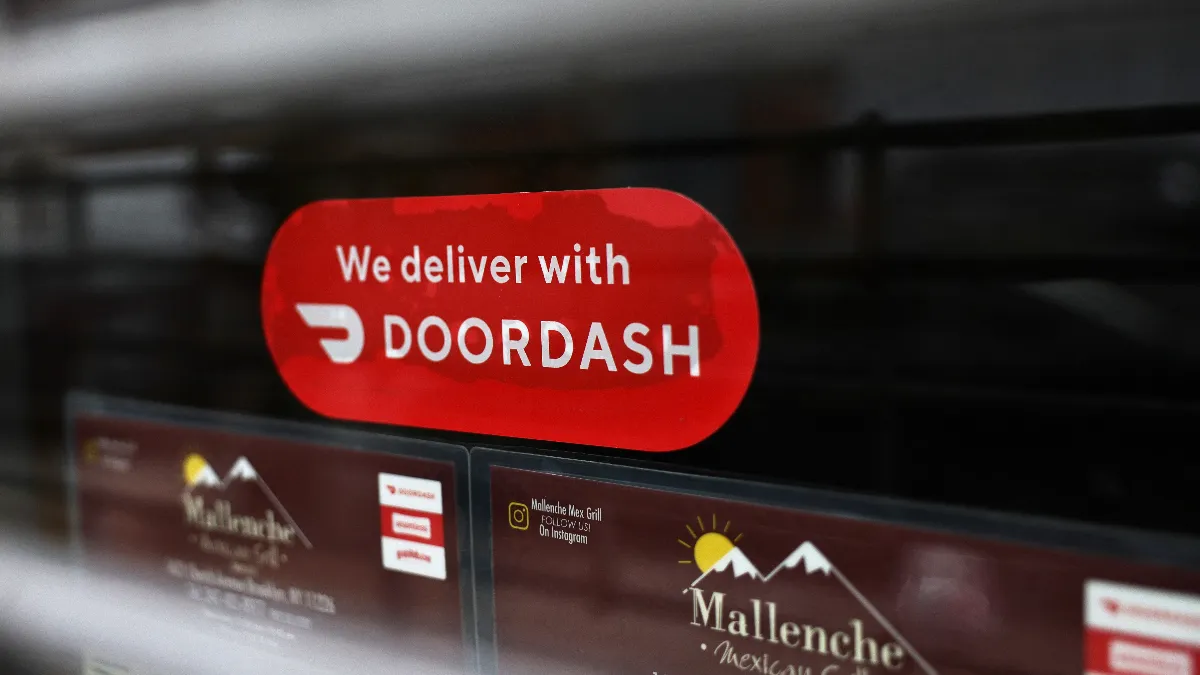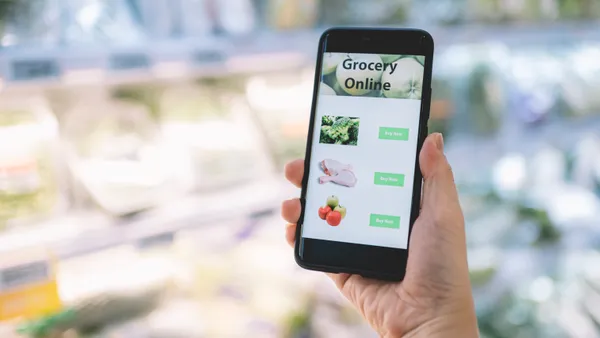Dive Brief:
- DoorDash is looking into ways it could use its DashMart convenience store service as a platform for grocers, Fuad Hannon, the company’s head of new verticals, said in an interview.
- Hannon said DoorDash is in the “early innings” of exploring a few models, including as examples, urban delivery from dark stores on behalf of grocers and dedicated delivery for retailers’ private labels.
- Although Hannon stressed DoorDash hasn’t firmed up plans here, his comments indicate the company is considering following Instacart in offering dark stores as a service to grocers.
Dive Insight:
As DoorDash plays catch-up with e-commerce leader Instacart and competes for customer dollars in grocery, it’s focusing on new services it can offer retailers that utilize its existing assets and technology, Hannon said.
One of those is DoubleDash, the tool it launched with Albertsons earlier this week that lets shoppers pile an order from one of its many restaurant partners onto a grocery delivery.
Another appears to be the dark store model it currently operates under its DashMart online convenience brand, which launched last summer and now has around 25 locations. The debut of that service, which runs through DoorDash-owned dark stores using its own assortment, signaled a new approach among e-commerce technology firms that have preferred to operate as service providers and marketplaces, and remain unencumbered by hardware, products and other physical assets.
It also has raised fears the company could compete with partner retailers on its marketplace — fears that could still be justified depending on how the company chooses to scale its own food services. Hannon declined to say if the company plans to scale a grocery offering similar to DashMart.
But Hannon said DoorDash is approaching DashMart as a platform that it could eventually open up to retailers. He likened the approach to its early grocery logistics strategy. Whereas a few years ago DoorDash would only deliver groceries placed through its marketplace, now it offers delivery as a service to grocers like Hy-Vee and Walmart.
“We imagine doing a very similar thing on the DashMart front where, from our point of view, it's four walls and a box that we can leverage to drive as much incremental value to our merchant partners and customers as possible,” Hannon said.
He cited two dark store service models DoorDash could implement: a private label marketplace and an urban delivery service.
“Imagine a grocer that operates in maybe only suburban locations of a given market, and they have no presence in the downtown urban core," Hannon said. "We're working with them on identifying key pockets of the market where we could partner together to bring a dark store model that's branded alongside the grocery store to customers in that area.”
Hannon said grocers are interested in offering faster delivery in line with the new 30-minute service Kroger just launched with Instacart. He cited demand for quicker delivery times in order to meet needs like last-minute dinner prep has been a key finding for DoorDash during the pandemic. It's also the opportunity that Gopuff as well as many ultrafast delivery companies like Gorillas and 1520 are chasing.
“The ability to get something delivered in 30 or 45 minutes to be able to have dinner ready in an hour — that is a really compelling consumer value proposition,” he said. “Does it need to be 45 minutes versus 30 minutes or 15 minutes? I don't think anybody in the industry has a crystal ball.”
He also noted DoorDash is seeing considerable demand for late-night convenience offerings, which tend to prize faster service.
“There's significant late-night demand that 30-minute and below delivery unlocks,” he noted. “You're not going to wait an hour at 11 p.m., but you might wait 25 minutes for delivery.”
DoorDash’s exploration of dark store services is happening as Instacart is moving decisively in the same direction alongside automated micro-fulfillment company Fabric. That news underscored the urgency for grocers, and for Instacart, to move fulfillment beyond store aisles and backrooms to accommodate higher volumes and boost efficiency. Hannon’s comments also indicate the potential for new standalone e-commerce services for grocers.
At the same time, the ramp-up in dark stores continues to fuel industry debate over whether e-commerce technology companies like Instacart and DoorDash will use those facilities to power their own grocery services. Instacart, for its part, has denied any plans to do so.
Whatever it's future plans entail, DoorDash, which has built its business on restaurant orders, is moving swiftly into grocery more than a year into a game-changing pandemic. Hannon said grocers are looking to the company for new services and innovations, and to tap into its user base, which includes 20 million monthly consumers.













